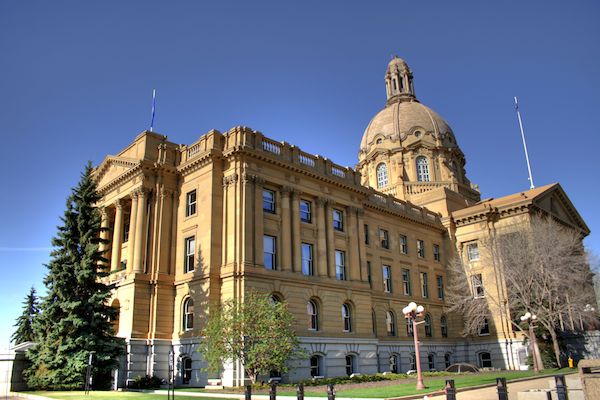Alberta
Albertans to vote on senators, equalization, daylight saving time

Albertans will have an opportunity to have their say on equalization and daylight saving time and elect nominees to the Senate when they vote in the fall municipal elections.
In addition to voting for Senate nominees, Albertans will be asked to vote on these two provincial topics on Oct. 18, in conjunction with the municipal elections:
- Equalization payments – Should the principle of making equalization payments be removed from the Constitution?
- Daylight saving time – Should Alberta end the practice of changing our clocks twice a year?
“Alberta has a long and proud tradition of grassroots, direct democracy. We will renew that tradition this fall. I encourage all Albertans to get engaged on these important issues and I look forward to taking part in the debate this fall.”
Equalization
Over the last 25 years, Albertans have contributed more than $400 billion more to the nation in tax dollars than they have received in federal spending. Albertans make an immense contribution to equalization through federal tax contributions, which are transferred by the federal government to other provinces for programs and services. The current program has many issues, including a formula that requires it to grow automatically with Canada’s economy, even if contributing provinces like Alberta are experiencing immense economic challenges.
Daylight saving time
Across Canada and the United States, more governments are bringing forward legislation to move to permanent daylight saving time, also known as summer hours. In 2019, Service Alberta asked Albertans if they thought we should make a similar shift. More than 141,000 Albertans responded, of which 91 per cent were in favour of year-round summer hours.
“Changing our clocks twice a year is something that every Albertan has an opinion on. As Alberta first adopted daylight saving time following a referendum in 1971, we owe it to Albertans to give them the same opportunity to make their voices heard now that we are considering another change.”
Senate elections
Along with the municipal elections and the two referendum questions this fall, Albertans will elect three Senate nominees – one for each of the two current vacancies and one in case of early retirement.
The Senate nominee election enhances democracy in the province by allowing Albertans to choose the individuals who will best represent them in Parliament. Having representatives elected by Albertans would increase senators’ accountability to Alberta voters to defend the province’s interests.
Provincial police and pension
For the topics of creating an Alberta Police Service and Alberta Pension Plan, further analysis and work are underway before next steps are determined.
“Through the Fair Deal Panel, Albertans who are policed by the RCMP said that they want to see Alberta build its own provincial police service to improve policing in their communities. We are continuing to study what this could look like and how it could improve the safety and security of Albertans and their property, as part of making an informed decision on the next steps.”
“The potential creation of an Alberta Pension Plan would be a significant decision for Albertans. As such, we are continuing the important work of completing an actuarial, economic and structural analysis so Albertans can make an educated and well-informed choice, and their questions and concerns can be adequately addressed. We look forward to putting this important decision on the table when the time is right.”
Quick facts
- The equalization question will be: “Should Section 36(2) of the Constitution Act, 1982 –Parliament and the Government of Canada’s commitment to the principle of making equalization payments – be removed from the Constitution?”
- Between 2014 and 2019 alone, Albertans made a net contribution of more than $100 billion to the federal government through federal taxes that helped build critical infrastructure.
- Alberta has not received an equalization payment since the 1964-65 fiscal year.
- The question on daylight saving time will be finalized this summer.
- During 2019 and 2020, legislation was tabled in British Columbia and Ontario to move to summer hours all year. These changes have yet to be implemented.
- In March 2020, the Yukon stopped changing their clocks and adopted Pacific daylight time year-round.
- Since 2018, 17 American states have passed legislation to move to summer hours (daylight saving time) permanently and more states are debating the topic. However, in the United States, federal approval is required to enact the change.
- Saskatchewan, Arizona and Hawaii do not change their clocks twice a year.
- The Government of Alberta would provide names of elected Senate nominees to the prime minister for consideration when filling Senate vacancies.
Alberta
Alberta judge sides with LGBT activists, allows ‘gender transitions’ for kids to continue

From LifeSiteNews
‘I think the court was in error,’ Alberta Premier Danielle Smith has said. ‘There will be irreparable harm to children who get sterilized.’
LGBT activists have won an injunction that prevents the Alberta government from restricting “gender transitions” for children.
On June 27, Alberta King’s Court Justice Allison Kuntz granted a temporary injunction against legislation that prohibited minors under the age of 16 from undergoing irreversible sex-change surgeries or taking puberty blockers.
“The evidence shows that singling out health care for gender diverse youth and making it subject to government control will cause irreparable harm to gender diverse youth by reinforcing the discrimination and prejudice that they are already subjected to,” Kuntz claimed in her judgment.
Kuntz further said that the legislation poses serious Charter issues which need to be worked through in court before the legislation could be enforced. Court dates for the arguments have yet to be set.
READ: Support for traditional family values surges in Alberta
Alberta’s new legislation, which was passed in December, amends the Health Act to “prohibit regulated health professionals from performing sex reassignment surgeries on minors.”
The legislation would also ban the “use of puberty blockers and hormone therapies for the treatment of gender dysphoria or gender incongruence” to kids 15 years of age and under “except for those who have already commenced treatment and would allow for minors aged 16 and 17 to choose to commence puberty blockers and hormone therapies for gender reassignment and affirmation purposes with parental, physician and psychologist approval.”
Just days after the legislation was passed, an LGBT activist group called Egale Canada, along with many other LGBT organizations, filed an injunction to block the bill.
In her ruling, Kuntz argued that Alberta’s legislation “will signal that there is something wrong with or suspect about having a gender identity that is different than the sex you were assigned at birth.”
She further claimed that preventing minors from making life-altering decisions could inflict emotional damage.
However, the province of Alberta argued that these damages are speculative and the process of gender-transitioning children is not supported by scientific evidence.
“I think the court was in error,” Alberta Premier Danielle Smith said on her Saturday radio show. “That’s part of the reason why we’re taking it to court. The court had said there will be irreparable harm if the law goes ahead. I feel the reverse. I feel there will be irreparable harm to children who get sterilized at the age of 10 years old – and so we want those kids to have their day in court.”
READ: Canadian doctors claim ‘Charter right’ to mutilate gender-confused children in Alberta
Overwhelming evidence shows that persons who undergo so-called “gender transitioning” procedures are more likely to commit suicide than those who are not given such irreversible surgeries. In addition to catering to a false reality that one’s sex can be changed, trans surgeries and drugs have been linked to permanent physical and psychological damage, including cardiovascular diseases, loss of bone density, cancer, strokes and blood clots, and infertility.
Meanwhile, a recent study on the side effects of “sex change” surgeries discovered that 81 percent of those who have undergone them in the past five years reported experiencing pain simply from normal movements in the weeks and months that followed, among many other negative side effects.
Alberta
Alberta Independence Seekers Take First Step: Citizen Initiative Application Approved, Notice of Initiative Petition Issued

Alberta’s Chief Electoral Officer, Gordon McClure, has issued a Notice of Initiative Petition.
This confirms a Citizen Initiative application has been received and the Chief Electoral Officer has determined the requirements of section 2(3) of the Citizen Initiative Act have been met.
Approved Initiative Petition Information
The approved citizen initiative application is for a policy proposal with the following proposed question:
Do you agree that Alberta should remain in Canada?
The Notice of Initiative Petition, application, and statement provided by the proponent are available on Elections Alberta’s website on the Current Initiatives Petition page.
As the application was received and approved prior to coming into force of Bill 54: Election Statutes Amendment Act, the Citizen Initiative process will follow requirements set out in the Citizen Initiative Act as of June 30, 2025.
Next Steps
- The proponent must appoint a chief financial officer within 30 days (by July 30, 2025).
- Once the 30-day publication period is complete and a chief financial officer has been appointed, Elections Alberta will:
- issue the citizen initiative petition,
- publish a notice on the Current Initiatives Petition page of our website indicating the petition has been issued, specifying the signing period dates, and the number of signatures required for a successful petition, and
- issue the citizen initiative petition signature sheets and witness affidavits. Signatures collected on other forms will not be accepted.
More information on the process, the status of the citizen initiative petition, financing rules, third party advertising rules, and frequently asked questions may be found on the Elections Alberta website.
Elections Alberta is an independent, non-partisan office of the Legislative Assembly of Alberta responsible for administering provincial elections, by-elections, and referendums.
-

 Brownstone Institute2 days ago
Brownstone Institute2 days agoFDA Exposed: Hundreds of Drugs Approved without Proof They Work
-

 Energy1 day ago
Energy1 day agoChina undermining American energy independence, report says
-

 Business1 day ago
Business1 day agoTrump on Canada tariff deadline: ‘We can do whatever we want’
-

 Automotive1 day ago
Automotive1 day agoElectric vehicle sales are falling hard in BC, and it is time to recognize reality.
-

 Business1 day ago
Business1 day agoEurope backs off greenwashing rules — Canada should take note
-

 Automotive1 day ago
Automotive1 day agoPower Struggle: Electric vehicles and reality
-

 Business7 hours ago
Business7 hours agoCanada Caves: Carney ditches digital services tax after criticism from Trump
-

 Alberta5 hours ago
Alberta5 hours agoAlberta Independence Seekers Take First Step: Citizen Initiative Application Approved, Notice of Initiative Petition Issued






